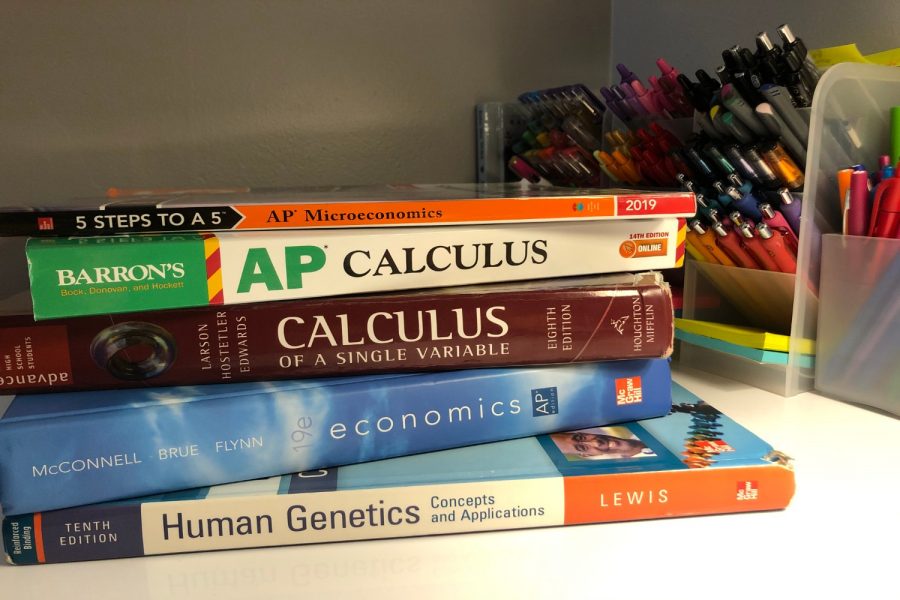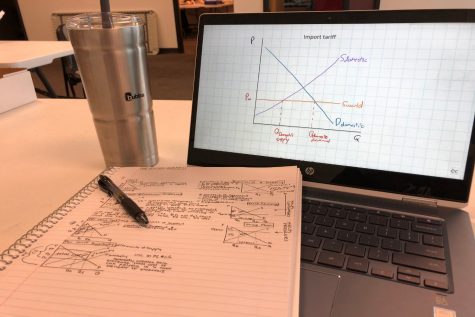College Board Adjusts to COVID-19 Outbreak
AP tests have changed drastically to accommodate to our current pandemic
College Board has provided students with several resources to be successful
Junior Natalie White walked into her third year of high school enrolled in four AP courses and signed up to take four AP exams. She studied, along with her classmates, since day one for tests that would cover a year’s worth of content to get college credit.
“[AP classes are] a lot more structured,” White said. “We [have] been preparing for written and multiple choice questions [all year].”
COVID-19 has shut down schools and taken away most students’ opportunities to finish their year’s worth of content. This pushed several schools, like Francis Howell Central, to cancel finals and EOCs. This pushed ACT to move its April test date to June and July. This pushed the College Board to drastically change AP exams.
“Because of COVID-19, college board has reduced the required materials for each class,” White said.
College Board has informed all students and teachers of these changes through email and their website.
“We know that the coronavirus pandemic has created new challenges for schools and students. To support students in continuing their AP journey, we’re offering optional free, online AP classes and take-at-home AP Exams,” said the College Board in a recent statement.
College Board has provided students with two testing dates, technology, and online webinars to provide students with any content they fell short of in the classroom.
The biggest change to the exams is the content and format in which they are tested. To prevent cheating and create credibility among testing, College Board has removed all multiple-choice sections of exams and has shortened the tests to a mere 45 minutes which is very different from the three hours each test used to take.
The College Board has also made a statement that this year’s exams are open note. There is no way for the College Board to ensure students are not looking at notes, so they decided to allow them for exams.
AP Calculus AB teacher, Mrs. Dena Dauve, expressed how these changes apply to her exam.
“The format of the exam is totally different from what we have been preparing for all year,” Mrs. Dauve said. “I know that everything I do for my Calculus classes is good for math and for instilling Calculus and its concepts, but now formulas don’t need to be memorized and there isn’t a no calculator portion, nor multiple-choice, which are things we’ve been practicing for all year. Now, instead of 52 questions, we will have probably eight total questions, and that is a huge difference.”
Along with the change in the test comes a change is some teaching. College Board cut the last unit from the AP Calculus AB exam to aid students who didn’t get the chance to learn it before COVID-19 shut down schools.
Mrs. Dauve also sees where the advantage of an open note exam is for her students and helps them use that advantage to the best.
“I will not worry about practicing the formulas and theorems for memory as much, since the exam is ‘open note’,” Mrs. Dauve said. “My students have created some great flipcharts and foldables for all of these, so I’d rather focus on my students having them completed with precision than worry about memorization at this point.”
All AP exams were altered relatively the same, except for world language exams. Language exams require students to speak, listen, write, and read passages with multiple choice questions. These tests were drastically changed to only two speaking prompts. Dra. Jennifer Miller, AP Spanish teacher, is taking advantage of the tools College Board has provided teachers and students to study for this new exam.
“I’m going to be assigning a lot of activities that AP has provided on their website. I can’t work with the class as easily, but I can give them lots of practice,” Dra. Miller said.
Regardless of how teachers prepare their students and how students prepare for their exam, several individuals are unsatisfied with how College Board has altered their exams. Most complaints are directed towards the new language exams.
“I wish they had left one writing prompt and one speaking, rather than basing the assessment of 5 years of study on less than ten minutes of speaking,” Dra. Miller said.
Students also wish they had more of a say in this decision.
“My only issue was how they surveyed a very small percentage of students compared to how many take the tests,” White said.
Although these changes are a setback for teachers and students, there may not have been many other options that would work given our current situation.
“I think they made the very best decision that they could. They had to uphold the integrity of the exam and multiple choice questions might not do that,” Mrs. Dauve said. “I would not have supported them cancelling exams this year. My Calculus kids have worked too hard not to be given the chance to demonstrate their knowledge and not earn college credit.”
Your donation will support the student journalists of Francis Howell Central High School. Your contribution will allow us to purchase equipment and cover our annual website hosting costs. FHCToday.com and our subsequent publications are dedicated to the students by the students. We hope you consider donating to allow us to continue our mission of a connected and well-informed student body.

















